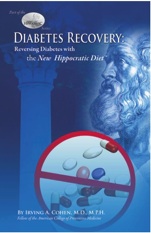Brought to you jointly by The Foundation for Prevention and Dr. Irving A. Cohen
KEY TOPICS AND QUICK LINKS:
Most people with prediabetes do not know it, but some are suspicious. You should work with your doctor by getting the right type of testing. Do not be satisfied if you get a routine fasting blood sugar level once a year and are told it is normal. During the first few years of developing Type 2 Diabetes your body fights to bring blood sugar down to normal overnight. Your fasting glucose level may be perfectly normal but you are overworking your pancreas pumping out more and more insulin and your cells become insulin resistant. This insulin resistance is associated with the inflammation that causes damage to your organs. This can go on for years before diabetes is recognized. Sadly, many people are not recognized as diabetic until after they develop other diseases that were caused by their unrecognized diabetes. If you think you may have Prediabetes, work with your physician and ask for the right tests. Here are some hints that you may be either prediabetic or already suffering from type 2 diabetes:

KEY TOPICS AND QUICK LINKS:
How do you know if you have prediabetes?
Most people with prediabetes do not know it, but some are suspicious. You should work with your doctor by getting the right type of testing. Do not be satisfied if you get a routine fasting blood sugar level once a year and are told it is normal. During the first few years of developing Type 2 Diabetes your body fights to bring blood sugar down to normal overnight. Your fasting glucose level may be perfectly normal but you are overworking your pancreas pumping out more and more insulin and your cells become insulin resistant. This insulin resistance is associated with the inflammation that causes damage to your organs. This can go on for years before diabetes is recognized. Sadly, many people are not recognized as diabetic until after they develop other diseases that were caused by their unrecognized diabetes. If you think you may have Prediabetes, work with your physician and ask for the right tests. Here are some hints that you may be either prediabetic or already suffering from type 2 diabetes:
Have you ever been told by a doctor you might have abnormal glucose (sugar), borderline diabetes, metabolic syndrome, heart or kidney disease?
Have you lost feeling in your feet or have tingling and burning sensations or told that you had a neuropathy? If you are a woman, have you ever been told you had polycystic ovary syndrome, or had a cyst diagnosed on your ovaries, or are troubled by facial hair, infertility, irregular periods or had excessive acne problems as a teen?
Have you been told you are overweight or obese? Is your waist 40 inches or more if you were a man or 35 inches if your are a woman? (Measure at your waist, even if you wear a smaller size by letting your pants slide below your belly!) These numbers are even lower if your ancestry is Asian or Latin American.
Is there diabetes in your family? Do you have an ethnic background, such as Native American or African-American with high rates of diabetes?
Had you ever thought you might be addicted to sweets or carbohydrates? Have you ever thought you might be hypoglycemic? Do you get nervous or anxious if you don't have a snack by midmorning?
These are only a few clues. Many people may be able to answer yes to these questions. If this seems like a lot, the Center for Disease Control estimates that one third of all adults in the United States will have diabetes by the year 2050!
The best answer is to take this problem seriously now. You can stop diabetes and prediabetes in its earliest stages without the need for insulin or diabetic medications. Regain control of your health through the right dietary changes. If you are suspicious about prediabetes get testing done by your physician. When you do, make sure that the tests you get and the changes you make are the right ones.
Some things you should know
Your purchase of books or courses at this website will help fund the Foundation for Prevention in its work.
Thank You.
Thank You.

